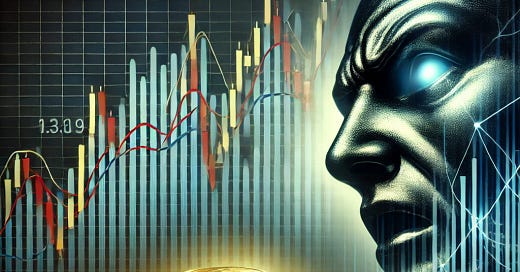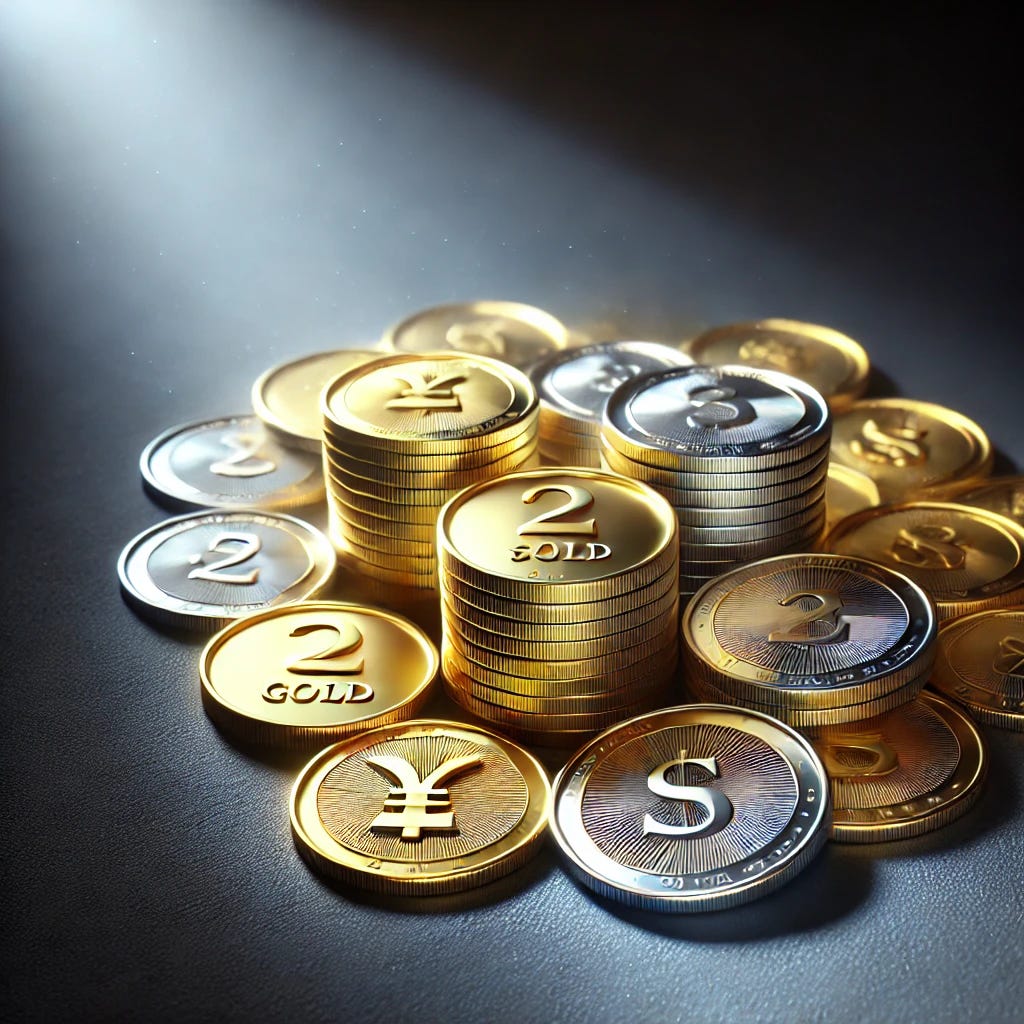"The Sound Money Duo: Maneco & Andy's Bold Predictions on Economic Collapse and the Future of Precious Metals"
In a recent episode of Liberty and Finance, host Kaiser Johnson sat down with industry veterans Andy Schectman, CEO of Miles Franklin, and Mario Innecco, founder of Manco 64, to discuss the precarious state of the global financial system and the role of precious metals in securing wealth during uncertain times. The conversation traverses a wide range of topics, from the rising demand for physical gold and silver, to speculative trading and the societal impacts of uncontrolled immigration.
As the world faces increasing financial volatility, geopolitical tensions, and mounting economic challenges, their insights serve as a critical reminder for investors to remain vigilant. This article aims to unpack the key points raised during the discussion, offering detailed analysis and insights into how these trends are shaping the broader financial landscape. Whether you're an investor looking to protect your portfolio or simply curious about the future of global markets, the topics covered in this conversation provide valuable perspectives on the risks and opportunities ahead.
The Fragility of the Global Financial System
The conversation starts with an exploration of the fragility within the global financial system, especially in light of rising interest rates. Andy Schectman explains that since 1982, interest rates have consistently dropped, leading people to assume that this will always be the trend. However, the recent shift towards rising rates is causing significant stress on businesses and individuals who are heavily in debt.
Andy Schectman: "The ability to maintain that debt becomes much, much harder. Everyone expects interest rates to continue falling, but they’re going in the other direction, and that would be the catalyst to blow up the system."
Andy highlights how decades of falling rates and cheap debt have influenced investors' psyches. The belief that things can only get better has made many complacent, neglecting the risks associated with rising rates and the mounting debt that many are struggling to service.
This shift in rates is an important indicator of potential instability. Higher rates increase the cost of debt, which in turn increases the risk of defaults. The article highlights how central banks' policies have artificially propped up markets for decades, and now, as the reality of rising rates sets in, financial markets and businesses may face severe challenges. Investors and businesses that are not prepared for this change might experience significant setbacks.
The Speculative Mania and Record Trading Days
Andy Schectman discusses a notable record in U.S. stock trading, specifically regarding penny stocks. He notes that trading in stocks under $1 reached an all-time high, signaling a speculative mania. He connects this speculative behavior with the broader sense of optimism, particularly surrounding President Trump’s potential role in improving the economy.
Andy Schectman: "Last week Tuesday was the record trading day in the United States all-time record for stocks trading under $1. That is associated with speculative mania."
The episode of speculative trading in penny stocks mirrors previous economic bubbles, where investors took on excessive risk, often without fully understanding the underlying economic conditions.
Speculative manias are often a warning sign of impending market instability. When investor behavior becomes detached from fundamentals, it signals irrational exuberance, a precursor to market corrections. The connection to the broader financial environment is that the increasing optimism around Trump's presidency has clouded judgment, leading many to overlook deeper financial risks.
The Rising Demand for Precious Metals
The discussion shifts towards the growing demand for precious metals, particularly gold and silver. Andy highlights significant purchases by the most informed and sophisticated investors in the world, such as central banks and large institutions, who are increasing their acquisitions of gold. Meanwhile, retail demand remains subdued, with gold and silver premiums falling to historical lows.
Andy Schectman: "The biggest, most sophisticated, well-informed money on the planet is doubling down on gold, not on cryptocurrency, not on money markets, and not on the Magnificent Seven."
The divergence between institutional and retail investor behavior is a critical indicator of future market trends. While the retail market is slow to react, institutional players are positioning themselves in precious metals as a hedge against potential financial instability. The rising interest in physical gold and silver is rooted in the belief that these assets will act as safe havens when financial systems begin to crack under pressure.
The Global and Cultural Impact of Uncontrolled Immigration
The conversation turns to the cultural and societal instability arising from uncontrolled immigration. Mario Innecco explains how immigration, particularly in Europe and the U.S., has created significant cultural tensions. He describes the process as being orchestrated by powerful individuals or organizations with globalist agendas, aiming to undermine national identities and sovereignty.
Mario Innecco: "I think the reason they’re doing it... is to destroy nations so that they can have a one-world system, which is easier to control."
Mario also reflects on the growing resentment among native populations and the potential for political backlash, noting recent elections where anti-immigration candidates have gained significant traction.
The immigration debate touches on both cultural and economic destabilization. From a financial perspective, uncontrolled immigration can strain public services and infrastructure, while also impacting economic policies. From a broader societal standpoint, the cultural clash between immigrants and native populations can lead to political unrest and rising populism, as seen in recent election results across Europe. This issue has significant long-term implications on the global economic and political landscape.
The Impact of Global Political Instability on Financial Systems
The discussion wraps up with a reflection on the potential political ramifications of these financial and societal issues. Both Andy and Mario point out how fragile the current geopolitical and economic environment is, citing the possibility of major financial system collapses or significant policy shifts. Mario notes that institutions may even attempt to manipulate elections to maintain control over economic systems.
Mario Innecco: "If the AFD (Alternative for Germany) wins, we're going to cancel that election."
This statement brings attention to the increasing centralization of power and the potential risks of authoritarian governance. If political stability is threatened by economic collapse or societal unrest, governments may resort to extreme measures to maintain order. The financial systems, in turn, could be significantly affected by such instability, as markets react to geopolitical shifts and investor sentiment is shaped by the underlying fear of systemic collapse.
The Significance of Physical Gold in Portfolios
Finally, both Andy and Kaiser discuss the value of including physical gold in one’s financial portfolio, even during periods of economic stability. Andy shares insights from Swiss bankers who emphasize the importance of holding gold as a small but essential part of a balanced portfolio. He reiterates that despite the apparent stability in markets, precious metals are crucial for mitigating risk during economic downturns.
Andy Schectman: "Even in the best of times, a 10% allocation to gold is critical for all Swiss bankers."
The advice to include gold in an investment portfolio highlights its role as a hedge against financial turbulence. While the markets may seem stable, external shocks, such as financial crises or geopolitical upheavals, can create a sudden demand for safe-haven assets. Andy’s reminder about Swiss banking practices underscores the long-term value of holding gold as a form of financial security, suggesting that precious metals should be considered a fundamental asset for investors.
Conclusion: Preparing for the Unknown
The interview on Liberty and Finance paints a picture of a financial world that is increasingly fragile and susceptible to systemic risk. With rising interest rates, speculative manias, and political instability, the need for sound investment strategies, including the acquisition of precious metals, is more important than ever. As global markets face increasing challenges, both economic and cultural, understanding the underlying risks and preparing for potential disruptions will be essential for safeguarding wealth.







